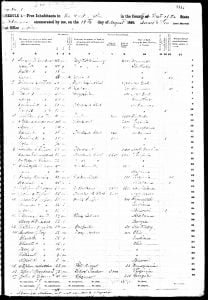Cook Family of Norwich Vermont
Three brothers, Samuel, Francis, and Lyman, with their two sisters, (children of Jonathan and Lydia [Aldrich] Cook), ran away from the Shaker settlement at Lancaster, Mass., where they had been placed by their parents before 1800, and came to this vicinity at an early day. Samuel settled in Norwich, and married Anna Pratt, by whom he had nine children. From Samuel the later generations of Cooks in town were descended. Francis also located in Norwich, on the farm now occupied by David Sargent, and there he lived and died. He was never married. Lyman Cook settled in Thetford. Another brother, … Read more

